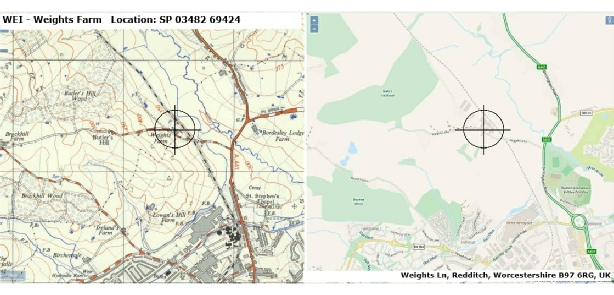

Farm:

Location:
SP 03482 69424
Weights Lane, Redditch, Worcestershire B97 6RG, UK
Location Now
Pre-New Town Location
Click image to Enlarge

Information about this Farm:
 Next
Back
Next
Back
WEIGHTS FARM takes its name from Edward Weight who farmed there in the seventeenth century when the farm was known as Sheepcroft. From the 1890s until 1936 Herbert French, his wife Mar)' and their two sons kept the mixed dairy and arable farm. During and just after WW2 the farm was in the hands of Fred Wright, whose brother had a butcher's shop in Redditch. Then in 1947, James Wood came down from Yorkshire and stayed with the Wrights anmd took obver the farm farming livestock including a herd of pedigree Friesian cattle. They also concentrated on dairy farming and pig rearing until an outbreak of swine fever in the mid 50s. Due to the lack of government compensation for the loss,they decided to sell the dairy herd and change to sheep farming and the growing of crops (barley, oats and beans), and this remained the main farming activity for many years until after the year 2000.
James and Sarah Ann's three sons all worked on the farm at first, but John eventually left to go into transport and moved to Canada. Sagar and Tom succeeded their parents and as the business prospered they bought, in 1971, the land of Shortwood Farm from the Pridhams. The next major purchase was that of Astwood Farm, Wychbold, in 1976, and Tom and his family moved there in 1981, leaving Sagar and his son Stephen to run Weights Farm. Further purchases of farm land followed in 1985 with 250 acres of Grange Farm from the Shaws and in 1997 300 acres of Lower Park Farm, Bordesley. Other smaller acquisitions were Lowan's Hill Farm (rented) and Ireland's Farm on Brockhill Lane (a small farm now occupied by new houses).
When Sagar Wood died in 1990 at the age of 62, there was a considerable gathering of local farmers and others in the congregation at Tardebigge Church for his funeral. Since then Stephen has carried out the development
of the Weights Farm Business Park, which now occupies some of the land and old farm buildings. This began in 1990 with the provision of an "inert" landfill site on the nearby hillside and continued with the opening of various vehicle and construction businesses.
The extensive sheep farming continued in the 1990s with some 3,500 breeding ewes. In the mid 1990s hostile action by "do-
Source: A Hundred Years In Tardebigge – The Revd Alan White
Status:

Click image to enlarge